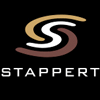AMETEK SPECIALTY METAL PRODUCTS - Advanced Metallurgical Products for Critical Applications.
United States
Manufacturer/ Producer


AMETEK SPECIALTY METAL PRODUCTS
United States
Cu-Ni 715 is a copper-nickel alloy that is resistant to corrosion in sea water. The alloy has good fatigue strength and relatively high thermal conductivity. This alloy is used mainly for flexible metal foil heaters. The alloy is readily formed in the annealed temper, and can be joined by the standard welding, brazing and soldering processes. Available Sizes: Cu-Ni 715 is available from Hamilton Precision Metals as strip product in thicknesses from 0.0005” to 0.010” (0.0127 mm to 0.254 mm) in widths up to 12” (304.8 mm). The material conforms to ASTM B122 and UNS C71500.
Request for a quote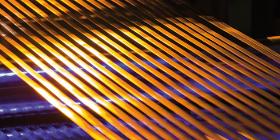
AMETEK SPECIALTY METAL PRODUCTS
United States
Shunt Manganin is a Copper-Manganese resistance alloy used for shunts in various high current applications. The alloy has a low temperature coefficient of resistivity with peak resistance at about 50°C. The thermal EMF vs. Copper is very low. The alloy can be easily formed from the annealed temper.The maximum recommended operating temperature in air is 200°F. Available Sizes: Shunt Manganin is available from Hamilton Precision Metals as strip product in thicknesses from 0.0005 to 0.053” (0.0127 mm to 1.346 mm) in widths up to 12.0” (304.8 mm). It is also available in foil as thin as 0.000100” (0.00254 mm) in widths of 4.0” (101.6 mm) maximum.
Request for a quote
AMETEK SPECIALTY METAL PRODUCTS
United States
Beryllium Copper 25 is a Copper base alloy with the capability of being strengthened by precipitation heat treatment. The alloy furnishes the best combination of electrical conductivity, corrosion resistance and mechanical strength necessary for numerous electronic and electromechanical devices. The alloy is quite satisfactory for fabrication with good formability and joining characteristics. Forming is readily accomplished from the annealed temper. Severe bending will be less successful from hard or heat treated tempers and requires large fold radius ratios. Beryllium Copper 25 is able to be soldered, brazed, and welded by most standard techniques. The brazing temperature must be kept under 1450º F and cycle time minimized to avoid loss of heat treated strength. Heat treating should be performed subsequent to welding to obtain uniform high strength. The alloy is not susceptible to an increase in magnetic attraction from plastic deformation during service
Request for a quote
AMETEK SPECIALTY METAL PRODUCTS
United States
Phosphor Bronze A is a Copper base spring material with a good combination of strength, formability, and corrosion resistance. The material is suitable for use in certain contact springs and diaphragms. The alloy has good formability up to moderate strength. It can be soldered, silver brazed, and resistance welded. Available Sizes: Phosphor Bronze A is available from Hamilton Precision Metals as strip products in thicknesses from 0.001” to 0.020” (0.0254 mm to 0.508 mm) in widths up to 12.0” (304.8 mm). The material conforms to ASTM B 103 and UNS C51000.
Request for a quote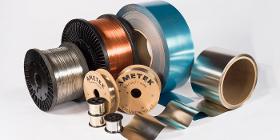
AMETEK SPECIALTY METAL PRODUCTS
United States
L-605™ is a nonmagnetic cobalt-based chromium-tungstennickel alloy that has excellent corrosion and oxidation resistance, and high strength at both room and elevated temperatures. Through work hardening, high strength levels can be obtained. L-605™ has a minimal heat treatment response, but can be used in the cold worked and aged condition. Applications include medical implant devices, springs, valves, and engine components for the aerospace industry. As a result of its high tungsten content, L-605TM is radiopaque, which is beneficial for implant medical devices, such as stents. Because of the alloy’s high work hardening rate, only minimal reductions can be taken before solution annealing will be required. L-605TM is very resistant to oxidation and scaling at elevated temperatures, and is nonmagnetic in all conditions. L-605™ is produced by vacuum induction melting followed by electroslag remelting (VIM-ESR), and as such, has a low nonmetallic inclusion level.
Request for a quote
AMETEK SPECIALTY METAL PRODUCTS
United States
Titanium exhibits a unique combination of properties including excellent corrosion resistance, high temperature resistance, and outstanding strength to weight ratios. Titanium is produced as commercially pure or alloyed. Commercially pure titanium is typically used in implantable medical applications whereas the titanium alloys are produced with the addition of vanadium or aluminum for applications such as aerospace. Hamilton Precision Metals processes strip and foil products in Titanium CP (Grade 1, Grade 2, Grade 4) and Titanium 3Al-2.5V (Grade 9).
Request for a quote
AMETEK SPECIALTY METAL PRODUCTS
United States
CP Titanium is selected for its favorable strength to weight ratio and excellent corrosion resistance. Two levels of purity permit a choice of finish strength. The alloy can be formed from the annealed temper. Severe forming may be aided by an intermediate stress relief at 1000°F. Stress relieving may be appropriate after severe cold forming to remove residual stresses. Welding should be performed with inert gas shielded arc or spot welding. Welding with active gases, coatings, or fluxes must be avoided to prevent embrittlement. Available Sizes: CP Titanium is available from Hamilton Precision Metals as strip product from 0.0005” to 0.025” (0.0127 mm to 0.635 mm) and widths up to 12.0” (304.8 mm). A foil product is available as thin as 0.000085” (0.002159 mm) and widths of 4.0” (101.6 mm) maximum. The material conforms to ASTM F67, ASTM B265, AMS 4902 and UNS R50250,R50400.
Request for a quote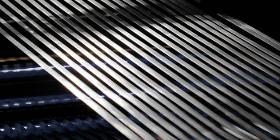
AMETEK SPECIALTY METAL PRODUCTS
United States
Ti Grade 9 is a near alpha, alpha-beta alloy, sometimes referred to as “half-6-4.” It offers 20 to 50% higher tensile strength than the commercially pure titanium at room and elevated temperatures. It is much more amenable to cold working than Ti 6AI/4V alloy and can be cold worked 75 to 85% to result in moderately high strength and good ductility The alloy can be formed from the annealed temper. Severe forming may be aided by an intermediate stress relief. Stress relieving may be appropriate after severe cold forming to remove residual stresses. Weldability and corrosion resistance is very similar to commercially pure titanium. Welding should be performed with inert gas shielded arc or spot welding.Welding with active gases, coatings, or fluxes must be avoided to prevent embrittlement.
Request for a quote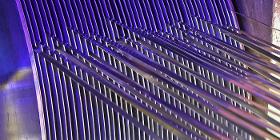
AMETEK SPECIALTY METAL PRODUCTS
United States
Cobalt-based metals are typically alloyed with chrome, nickel, iron and tungsten. They are used in challenging environments in applications that demand high temperature strength and hardness, excellent wear and corrosion resistance.
Request for a quote
AMETEK SPECIALTY METAL PRODUCTS
United States
Constantan® is a copper-nickel alloy that contains specific minor amounts of additional elements to achieve precise values for the temperature coefficient of resistivity. Careful control of melting and conversion practices results in a very low level of pinholes at ultra-thin thicknesses. The alloy is used extensively for foil resistors and strain gauges. The TCR can be adjusted from the furnished cold rolled values by using a low temperature heat treatment to achieve compensation for all types of spring elements. The foil is normally supplied with 90% cold reduction and a smooth bright surface. The foil is reasonably flat at 4” wide and nearly free of pinholes. The cold rolled foil can be produced with a TCR between +10 to –35 PPM/°C. The heat treatment will shift the foil TCR to the desired value. A typical heat-treat curve for Constantan® shows decreasing resistivity but increasing TCR with increased heat-treating temperature.
Request for a quoteManufacturer/ Producer
3900 Germantown Pike
19426 Collegeville - United States
europages also recommends
A selection of companies related to the activity:
A selection of products that might interest you

HS UMFORMTECHNIK GMBH
Germany
Suction lances / suction tubes can be delivered in different diameters right from stock. We also can manufacture according to your drawing and/or sketch or sample. material: stainless steel AISI 304 or aluminium AlMgSi 0.5 F22 in all common tube dimension 40.0 / 50.0 and 60.3 mm right from stock special versions can be realised at short notice and for short delivery
Request for a quote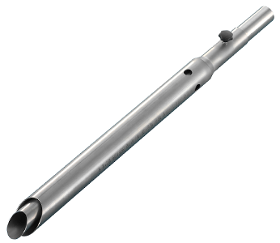
HS UMFORMTECHNIK GMBH
Germany
Suction lances / suction tubes can be delivered in different diameters right from stock. We also can manufacture according to your drawing and/or sketch or sample. material: stainless steel AISI 304 or aluminium AlMgSi 0.5 F22 in all common tube dimension 40.0 / 50.0 and 60.3 mm right from stock special versions can be realised at short notice and for short delivery
Request for a quote
HS UMFORMTECHNIK GMBH
Germany
Our stainless steel pipes offer the following characteristics: pipe ends deburred quantity delivered in accordance with customer’s specifications well and protective transport packed
Request for a quote
HS UMFORMTECHNIK GMBH
Germany
In pneumatic conveying systems, conveying abrasive products – in particular at high conveying speeds – leads to abrasion and thus to wear in the pipe bends. In order to prevent this, the pipe bend of our highly wear-resistant DWR double-skin stainless pipe bends is encased in a second pipe bend, which creates a double-walled chamber. This acts, so to speak, as a “protective shield”: After the wear has taken place on the internal pipe bend, it fills with the product to be conveyed. When this process is completed, you are then conveying „product on product“ – and no further wear is possible! Version I: „Product-on-product” In this variant, the classic “double skin” comes into effect. not suitable for foodstuffs not suitable for material change Version II: „Lined with concrete” lined with extremely hard concrete colour: light grey not suitable for foodstuffs also available: lined with borosilicate glass
Request for a quoteRequest for quotes
Create one request and get multiple quotes form verified suppliers.
- Only relevant suppliers
- Data privacy compliant
- 100% free
